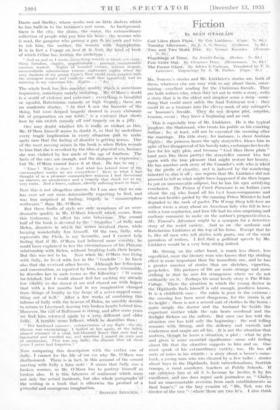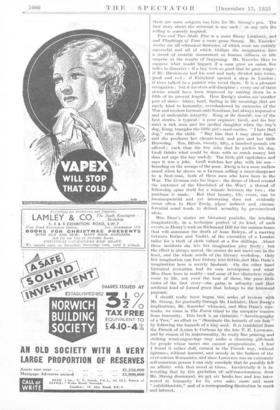Fiction
By SPAN OTAOIAIN God Likes them Plain. Erie Lieidater, (Caw. 7s. (i0.) •
Tuesday Afternoon. A. rong. (Quilanez. Two andTwo! Make Five. By 17ertioti Kia;wIes. (Newnes.
Playthings of Time. By Arnold= Zweig... (Seeker. • 7o. 6(1.)
Fate Cries• Out: B rn
,
Mu. STRONG'S stories and Mr. Lir:Mathes stories are, both of them, whatever else one may wish to say about' thein,'enter- tabling --excellent reading for the ,Christmas .fireside. They arc both writers who, when they set out to write 'a story, write a story that is in the oldest and sim'PleSt senSe:it thing that could meet safely the final Tolstoyati test the'y could fit as a treaSUre into the elevVy-nook of any cottager's or 'busman's fireside. They do not despise plot,- surprise, tension, event ; `they :have a beginning and an end.
. .
;This is especially true of Mr. Linklater. He is the typical jongleur, the"Shahrazad, who treats his public as his enacting SUlten ; he, at least, willnot be executed the morning after the marriage.: His title story, for instance, is sheer Arabian Nights : .the princess hears the ugly storyteller, kisses him in spite of her disapproval of his bawdy tales, exchanges her lovely facie for:his ugly phiz, and because " God likes them plain " (and men like them pretty) the storyteller cannot kiss her again with the true pleasure that might restore her beauty. He has another arch story of the Crusader's wife who is irked by the girdle of chastity, and is induced by the wandering minstrel to slim it off ; one regrets that Mr. Linklater did not. proceed toll its what might have happened if slw 111(.11 began
u
to put on unremovable adipose, but he has his op:11 satisfying conclusion. The Prison of Cooch Parwanee is an Indian yarn about the raj who found all his lest boon-companions and what-not-besides gaoled by the cunning Prime Minister he had degraded to the. rank of gaoler. The Wrong Story tells hoW an author wrotee-a story about an American lady who fell in love with a tour-conductor, and how life had its own surprising and sardonic comment to make on the author's prognosticatiors. Mr. Timrod's Adventure might be a synopsis for a detective story of the Weird variety. And so on---the sardonic and Rabelaisian Linklatcr at the top of his form. Except that he is, like all men who tell .steries.With gusto, one of the most garrulous of writers. I feel:I:het: a political speech by Mr. Linklatcr would be a very long sitting indeed.
Mr. :Strong, 'On the other hand, is much 'less direct, less superficial, more the literary man who knows that Ur abiding ePfeet is more important than the immediate one; and he has a greater number of stories that arc sketches, vignettes, peep-holes. His pictures of life .arc more strange and more striking in that he sees his strangeness where we do not ordinarily see it. Perhaps his most lovely story is The White Cottage. There the situation in which the young doctor in the :Highlands finds himself is odd enough, goodness knows. It is it childbirth -ease : the cabin is poor in the extreme : the crossing has been most dangerous,' for -the storm is at its 'height there is not a second suit of 'clothes: in the house; quite simply the • doctor and the hukband lie beSide 'the expectant mother while the rain beats overhead and 'the firelight flickers on the „rafters. But once one has told the situation one has told only the beginning : the real telling remains with Strong, and the delicacy and wernith 'end terekrness and Magic arc all his.. r:It is not-the situation that mat ters, though he loves a ,situation, a plot ; what he gets and gives is some essential' significance----some - odd feeling about life that the situation suggests to him and us. One must. speak of his extraordinary variety, too. He has all sorts of notes in his whistle : a story about a boxer's come- back, a young man who was cheated by a Jew tailor stories about boys in the Highlands, Irish tatterdemalions, Scottish tramps, a rural murderer, teachers at Public Schools. If ore. criticises him at, all it is „because he invites it by his exCellence, and 'one' does regret such journalese as, " Gladys had an unaccountable aversion from such establishments as Saul Isaac's," or the lazy .evasion of, "He, Ted, was the Aireder of the two ":-::-)Vhere'there' arc two he's. I also think there, arc some subjects too trite for Mr. Strong's pen. The first story about the overcoat is one such : at any rate the telling is scarcely inspired. Two and Two Make Five is a more flimsy Linklater, and and Playthings of Time a more gross Strong. Mr. Knowles' stories are all 'whimsical fantasies, of which sonic are entirely successful and all of which titillate the imagination into a mood of amiable amusement at human silliness or idle surprise at the results of Supposing. Mr. Knowles likes to suppose what would happen if a man, grew an onion five miles in diameter if a boy were so good that he grew wings : if Mr. Blenkinsop had his soul and body divided into twins, good and evil ; if Fairyland opened a shop in London ; if trees talked to a painter who loved them. It is a pleasant Occupation ; but it involves self-discipline ; every one of these stories would have been improved by cutting doWn to a fifth of its present length. Herr Zweig's stories are another pair of shoes—bitter, hard, finding in life meanings that are rarely kind to humanity, overshadowed by memories of the War and modern German anti-Semitism, but always impressive and of undeniable integrity. Kong at the 'Seasick, one of the best stories, is typical : a poor engineer, Groll, and his •boy meet a rich man and his spoiled daughter. *hen the boy's dog, Kong, tramples the little girl's sand-castles. " I hate that dog," cries the child. Buy him that I may shoot him," and she produces her cheque-book and pen and her little Browning. Ten, fifteen, twenty, fifty, a hundred pounds 'ate offered ; each time the boy sobs that he prefers 'his ,dog. Groll thinks what could be dime with so .much .money. but does not urge the boy unduly. The little girl capitulates and says it was a joke. Groll watches her play with his son— brooding on the wrongs of the poor. Zweig is in a more mellow mood when he shows us a German selling a razor-sharpener to a Scotsman, both of them men who have -been in the War. The German cuts his finger : the drops of blood remind the customer of the bloodshed of the War; a thread, of fellowship spins itself for a minute between the two ; the purchase is made. But that beauty; life, event, can be inconsequential and yet interesting does not evidently occur often to Herr Zweig,, wilosc indirect and circurn- ferential mind tends to delimit actuality by preconceived ideas.
Miss Dane's stories arc historical pastiche, the retelling imaginatively, in a technique perfect of its kind, of such events as Henry's wait on Richmond Hill for the cannon-boom that will announce the death of Anne Boleyn, of a meeting between Esther and Vashti, of the execution of a London tailor for a theft of cloth valued at a few shillings. AbOut these incidents she lets her imagination play freely ; but the effect is always unreal, the'etories do not Move. one. in_the least, and the whole smells of the literary workshop.. Crnly hot imagination can fuse history- into fiction, and Miss Dafie's imagination here is merely lambent; -On the other hind historical. recreation had its own recompense and • wliat Miss Dane loses in reality-=and none of hcr characters really come. to life, not even • the best: Of thorn, -the poor-little tailor of the first story—she gahis, in urbanity and- that artificial kind of formal grace that belongs to the historical pageant. • I should really have begun,. this series of reviews with Mr. Strong, for gradually through Mt. Linklater, Kerr Zwers implications, Mr. Knowles' whimsies, and Miss Dane's w x- works, we come in The Forest Giant to the complete remove from humanity. This book is an elaborate " Autobiography of a Tree," an effort to " illuminate the hakards• of our fate " by following the hazards of a tiny seed. It aS translated Om the French of Aiirien le Corbeau by the late T. L. Lawrence, and by reason of its impersonality, its really line printing and striking wood-engravings may make a charming gift-book for people whose tastes one cannot prognosticate. I fear I found it rather dull; earnest' in the French way, without lightness, without humour, and moody in the fashion of the over-solemn Romantics, and since Lawrence was an extremely self-conscious persim I can only conclude that he poSsibly felt an affinity with that mood at times. Incidentally it is in. teresting that by this gradation of self--Conscionsnesi, from Mr. Strong downward, We get six books less and less inter. rested in humanity for its own sake, more and more " exhibitionistic," and of a corresponding diminution in merit and interest.















































 Previous page
Previous page